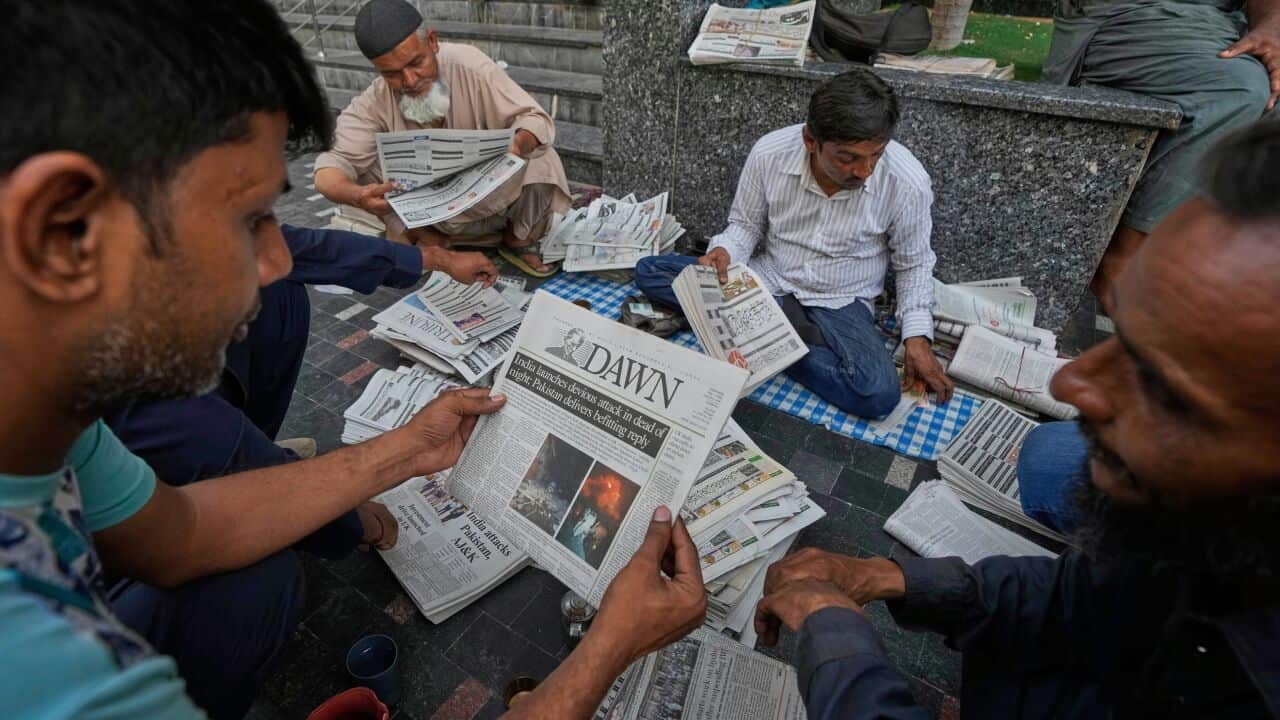Perth-born Sukhjit Kaur Khalsa has made a name for herself as a spoken word poet in Australia and beyond, over the past few years.
She was a teenager when she spoke up against bullying on a national stage. Recalling the moment, she tells SBS Punjabi, "You know around six or seven years ago, I was only 17 when I made that parliamentary speech on bullying. Right away, people in their 30's, 40's, 50's and 60's started sending me their stories and I realised that people carry these scars throughout their lives if they’re not able to voice their truth."
She made a mark across Australia when she recited spoken word poetry about Sikh identity on a commercial television show on mainstream media, but she didn't expect the reaction she received thereafter.
"In the last two to three years after I appeared on Australia’s Got Talent, what's happened is that instead of commenting on my poetry, a big group of people from our community only focused on what I looked like." "I went on Australia's Got Talent thinking Australia would get mad at me because I was talking about controversial things. Surprisingly, what happened was that my community couldn’t handle what I was standing up for, which included women's’ rights, and that really hurt a lot."
"I went on Australia's Got Talent thinking Australia would get mad at me because I was talking about controversial things. Surprisingly, what happened was that my community couldn’t handle what I was standing up for, which included women's’ rights, and that really hurt a lot."

Sukjit Kaur Khalsa is going to perform after two years in a 75 minute theatre show called Fully Sikh Source: Supplied
"You see, bullying now happens online – there is Instagram, Facebook, Twitter and people say very abusive things there."
Sukhjit says she received hundreds of abusive messages from people within the community, questioning her Sikh identity.
"People would say things like you're not a Khalsa, you need to take that surname away. You’re not a Sikh, you’re not a Kaur, you’re not pure, you’re not a true representation of the community."
"It felt like I needed to prove myself to them. People asked me how much kirtan (religious renditions) I did – and I remember sending them videos of my 4-year-old self doing kirtan, to prove the point."
"It’s hard enough to try and make your own place growing up in Australia, but it hurts so much more when you have to prove yourself to your own community. It's very very hurtful".
"It caused me so much pain I actually stopped performing. This theatre show is my first performance in two years because I just had to recover from all that. I have actually screen-shotted over 200 messages from people in our community, some of which are just so rude and full of swearing that I can't even say them out loud."
"They’ve said things about my body which is very disrespectful to women – I think those people just don’t understand what I’m trying to say, and perhaps they’re not ready to receive someone who is trying to do something different."
So after a hiatus of two years, Sukhjit is taking to the stage again with what she calls "the first-ever Sikh Australian show - that too all in poetry."
"For the last two years, I’ve been travelling around Australia and other parts of the world, meeting Sikh communities, and especially Sikh youth. I didn’t realise this, but I was gathering lots of research about what young Sikh children are facing in America, Malaysia, England, Canada and Australia – all of this is going into a theatre show. I was approached by a theatre company in Perth to write this because they thought my story was very interesting."
The show opens in Perth this year when Sukhjit performs a 75-minute play she's written herself. The title, she says with a chuckle, "is Fully Sikh."
"It’s a story of courage, fighting those multiple worlds of being Australian, being a young girl, being hairy, trying to break a cycle that’s been going in our culture on for a long time. It’s about owning your story and not becoming a victim."
She says as a brown, hairy girl growing up in Australia, she was no stranger to bullying.
"Bullying doesn’t only happen or finish in school – it occurs at every stage of life. I’ve seen it and experienced it as well. It gets my blood boiling and sparks the fire in my belly because my Sikh values make me stand up for the rights of minorities and those who are marginalised."
Bullying in the schoolyard is used as a metaphor in this play, for what happens in business, in politics, in society and everywhere around us.
'It took me two years and eight drafts to write this play, which I've written for young Sikh girls, their fathers and their bullies." "For the non-Sikh audience, this is a chance to enters a Sikh world and real Sikh home. I’ll be cooking on stage and people will actually get to eat daal-roti. They will be immersed in the sounds and smells of a Sikh home."
"For the non-Sikh audience, this is a chance to enters a Sikh world and real Sikh home. I’ll be cooking on stage and people will actually get to eat daal-roti. They will be immersed in the sounds and smells of a Sikh home."

Sukhjit Kaur Khalsa (right) with Pavan Hari, who provides music on her show Fully Sikh Source: Supplied
"It's akin to letting people inside our home – and introducing them to the compassion and hospitality in our culture."
Although it is a one-woman show, where Sukhjit does all the speaking and characterisation, there is a unique twist with the musical accompaniment.
"Pavan Hari will provide live music using traditional instrumental like a harmonium, tabla and veena, whilst also improvising with kitchen items like daal, rice, kidney beans, pots and pans to create live music." New episodes of The Hunting air Thursdays at 8.30pm on SBS and are available to stream at SBS On Demand.
New episodes of The Hunting air Thursdays at 8.30pm on SBS and are available to stream at SBS On Demand.

An oil painting of Sukhjit Kaur Khalsa Source: Katherine Gailer Art
More from SBS Punjabi

Sukhjit Kaur Khalsa: Taking down patriarchy one spoken word at a time






